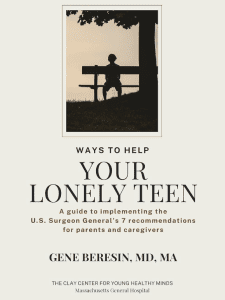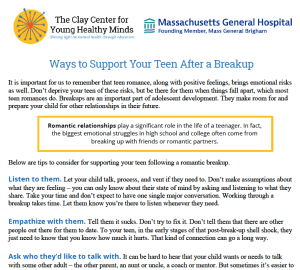The Trauma Felt In Teen Breakups

Posted in: Parenting Concerns, Teenagers, Young Adults
Topics: Relationships
Teen breakups. When you’re 17 years old, breaking up with someone really, really hurts.
Yes, that’s a cliché. So much so that almost every adult can think of a favorite popular culture reference to this particular kind of pain. My personal favorite occurs at the heartbreaking beginning of Nick Hornby’s novel, High Fidelity. You can watch John Cusack deliver that riff in the film version, here.
So why would I bring up a scene from old cult classic, if I am writing an article about teenagers today? Because it helps us to relate and to remember. That opening scene reminds adults that these feelings are intense, painful, and almost certainly better suited for the more developed brains of mature folks…like parents, for example. But parents often forget this.
Breakups are so much a part of our culture, as well as our own melancholic and yet laughing memories, that those of us who care for teens sometimes don’t realize how much kids suffer when a romance fails. As adults who’ve survived it all before, we might take for granted that breakups happen and that we get through them. And most of the time – heck, the vast majority of the time – we do get through them.
Still, as a child psychiatrist and as a parent (and as a former teen who suffered his fair share of pimply, shattered romances), I remind all the adults and parents out there:
When teen breakups occur, we need to take special notice.
Breakups create all sorts of suffering, and sometimes that suffering is more intense than anyone suspects.
Breakup Trauma – What the Research Says
Here are some of the data about teens who experience breakups:
- Although studies vary, most suggest that about 20% of relationships end in breakups. For heterosexual relationships, it looks as though girls break up more often than boys. The data is less clear for same-sex romantic pairings. Kids will cite all sorts of reasons for breaking up, but one of the more common themes is the issue of “fit.” This explains the ever-common “It’s not you, it’s me,” conversations.
- Breaking-up with someone is a significant risk factor for depression. We might think someone suffering after a breakup is understandably more emotionally down. But, by making this often accurate assumption, we run the risk of missing an evolving and much more serious clinical depressive state.
- Kids who suffer a breakup tend not to talk about it to their parents. They’ll talk to their friends, and they’ll tell the whole world on social media, but the data suggests that kids who get clinically depressed after a breakup don’t usually let the adults in their lives know. They are more self-silencing after a breakup than in other depressive states – hiding feelings on the outside, while agonizing on the inside.
- We also know that romantic issues are responsible for a significant number of kids who attempt or even take their lives by suicide. Some of the time these events are impulsive, some are related to the suicidal thinking that accompanies clinical depression, and some are even related to trauma. Certainly, there is a body of research showing that kids who have romantic breakups experience nightmares, flashbacks, and emotional constriction – the hallmarks of PTSD. We just don’t call it PTSD because the trauma of a breakup seems too normal to rise to the level of a traumatic experience. But try saying that to a tearful 15-year-old. They’ll tell you, if they can get it into words, that they feel pretty horrifically traumatized.
All of this is to say that breaking up, whether or not it leads to clinical symptoms, sucks (pardon my French). That said, if your teenager goes through this awful but totally normal experience, there are some things you can do to help.
Helping Your Teen Survive a Breakup
- Tell them that it sucks. Don’t try to fix it. Definitely don’t tell them that there are other people out there for them to date. That’s the definition of not understanding the situation, as far your son or daughter is concerned. To that kid, in the early stages of that post-break-up shell shock, he or she just needs to know that you know how much it hurts. That kind of connection can go a long way.
- Remember that your teen’s best bets for support are his or her peers. I recall a buddy telling me that I had moped long enough after my girlfriend broke up with me, and that he was telling me this “for my own good.” I laugh when I recall the seriousness of his hallway intervention, but imagine if my parents had said that. I would’ve shut down even more, I think. I’d feel like I had let them down. But my friend could tell me, earnestly and with love, that it was time for me to get back into the swing of things or to get some help. For teens, friends are typically better at this kind of tough love than parents. If your teens stop hanging out with friends, that’s cause for worry for two reasons. First, your teen needs friends to help him or her to negotiate the tricky feelings and social rearrangements that break-ups engender. And second, if your teen is more socially isolating, it’s time to have a talk. You need to worry about a developing depression.
- Tell them you’re worried and you want to know how they’re doing. Don’t scold your teen and tell them to get over it. But do ask them how they’re sleeping. Are they eating less? Are they enjoying anything at all? These are hallmarks of depression. If these behaviors are taking place for more than a couple of weeks, contact your primary care doctor or a mental health professional. And if you are at all worried, regardless of how long it’s been, contact these professionals. It’s also OK, and even a good idea, to ask your teen whether he’s ever thought of harming himself. Again, this will most likely be met with an irritated eye-roll, but your teen will know that you care. It’s always better to ask. If the answer is yes, let your doctor know as soon as possible.

Order your copy of Dr. Beresin’s new guide.
Teen romance is great. Many of us have some pretty fond memories of these experiences. And for all sorts of good reasons, we selectively forget the pain. That’s why it makes sense, as summer works its magic on the romantic proclivities of our adolescent children, to keep in mind that romance brings it with it some pretty big risks as well. Don’t deprive your kids of these risks, but be there for them when the thing falls apart. After all, most teen romances fall apart. They’re designed that way. How else can you make room for all the new relationships that flower with the coming of autumn?



 Share
Share Tweet
Tweet





